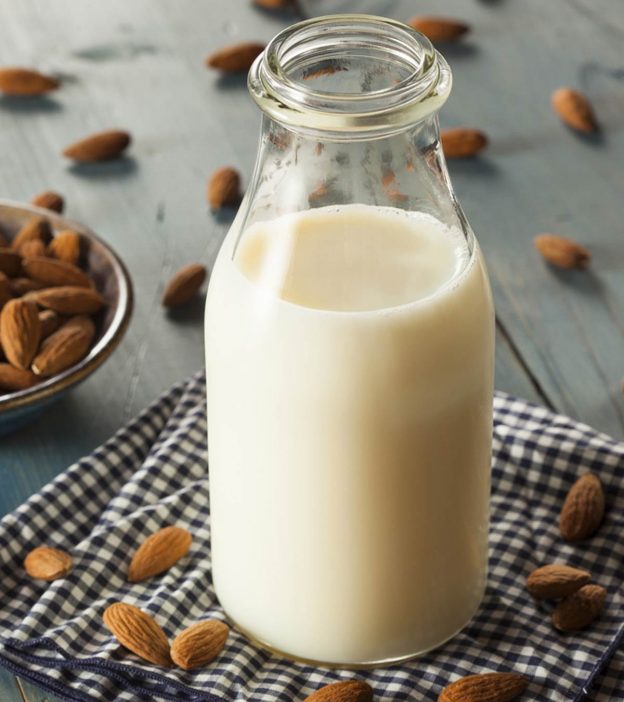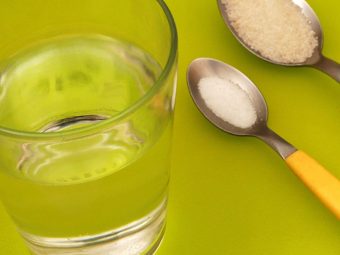
Image: iStock
Almond milk is a derivative of powdered or pasted almonds. This paste or powder is combined with water and then strained to obtain milky white, nutty-flavored liquid(1).Almond milk for babies is a good alternative for infants who are allergic or intolerant to animal milk. This milk is commercially available in different variants but with added ingredients such as micronutrients (calcium and vitamin D), thickening, sweetening, and flavoring agents, and preservatives.
Most people use almond milk as a substitute for animal milk in preparing sweets and savories. But you may wonder if almond milk is safe for a baby?
Read this post to explore the nutritional value of almond milk compared to cow’s milk. Also included in this post are a few healthy almond milk recipes for toddlers.
Can Babies And Toddlers Consume Almond Milk?
Babies older than 12 months should drink fortified or whole cow milk (2).然而,你可以强化杏仁牛奶your toddler as a beverage, not as an alternative to dairy milk.
Generally, almond milk is not recommended as a replacement for breast milk and dairy milk for children below 24 months of age(3).According to the American Academy of Pediatrics (AAP), organic plant-based milk, such as almond milk, may lack essential nutrients, such as vitamin D, protein, and calcium. Except for soy milk, the academy does not recommend plant-based milk as a replacement for dairy milk (4).
The World Health Organization recommends exclusive breastfeeding for babies up to the first six months (5).Breastfeeding, along with solid food, should continue for at least 12 months. If breastfeeding is not possible, fortified infant formula is advised (6) (7).
If the child has a milk allergy or lactose intolerance, ahypoallergeniciXLess likely to cause an allergic reaction., lactose-free soy-based formula is recommended (8).Vegan parents and parents with children who have dairymilk intolerancesiXCondition causing digestive symptoms after consuming food containing milk proteins without immune system involvement.should speak to a pediatrician before picking a suitable alternative to dairy milk (9).
Nutritional Value Of Almond Milk vis-a-vis Cow Milk
Almond milk contains less energy, protein, fat, and vitamin D per 100 grams than cow milk and soy milk(10). Even when fortified, almond milk has less protein, fat, and vitamin D than whole cow milk(11). Therefore, it is not recommended for children with protein-energy malnutrition, vitamin D deficiency and those at risk.
Therefore, experts recommend using whole cow milk while weaning a toddler since it can provide an optimum amount of protein andfat. However, you may serve almond milk to the toddler as a beverage or as part of food preparations.
Are There Any Health Benefits Of Almond Milk For Toddlers?
不加糖的和强化饮料,比如杏仁milk serve as part of a well-balanced diet and may offer the benefits of almonds to the toddler.For instance, almonds have high amounts of MUFA (mono-unsaturated fatty acids) and essential nutrients, such as potassium, zinc, manganese, and vitamin-E(1)(12). Almond milk could be a source of these nutrients for toddlers.
Almond milk also contains bioactive compounds that could impart health-benefiting properties, such asimmunostimulationiXStimulation of the immune system upon exposure to xenobiotics (chemical substances foreign to the body) and pathogens., over time.Additionally, whole almonds can be a choking hazard for toddlers(13), and almond milk could be a safer alternative if your toddler desires to eat almonds.
What Are The Non-Dairy Milk Alternatives?
Image: IStock
If almond milk isn’t an option for your toddler, you may consider other plant-based milk, such as rice, oats, hemp, coconut, soy, and hazelnut milk. Consult a pediatrician or registered dietitian/nutritionist before choosing a non-dairy milk alternative. They can help you select the right plant-based milk after considering your toddler’s age, health, and dietary needs.
Precautions To Take While Using Almond Milk For Toddlers
- Consult a pediatrician before using almond milk你的孩子,特别是如万博体育手机官方网站登录果有一个家庭history of nuts allergy. An individual with a tree nut allergy can’t consume almond milk because it can trigger allergic reactions(14).
- Do not use homemade almond milk for toddlersas it lacks essential nutrients. Instead, buy unsweetened, fortified almond milk from a reputable brand. You may use homemade almond milk in some almond milk recipes, though.
- Check the nutrition facts label of the milkThe label should give information about the product’s nutritional value, added ingredients, such as flavoring and other additives. Stay clear of variants that contain high amounts of added sugar.If you are unsure about choosing the right almond milk brand for your toddler, consult a pediatrician or certified nutritionist.
Image: Shutterstock
- Babies older than one year need almond milk only as a drinkand not a meal. Serve almond milk as a beverage or as part of food preparations,such as porridgeor yogurt.
In the next section, we share some simple and healthy almond milk recipes you can try for your toddler.
 Point to consider
Point to considerAlmond Milk Recipes For Toddlers
If your doctor gives you a nod of approval, you may consider trying the following nutritious almond milk recipes for your toddler.
1. Almond milk yogurt
You will need:
- 2½ cups water
- 1 cup almonds (blanched)
- 1 pack non-dairy starter culture
How to prepare:
- Blend almonds and water into a smooth liquid using a fine-blade blender. Strain the liquid into a bowl through a cheesecloth. Set aside.
- Measure the starter’s quantity, as mentioned in the instructions on the package, and add it to the almond milk. Mix well and put the bowl into a yogurt maker for fermentation.
- If you do not have a yogurt maker, place the bowl into a Dutch oven and store it in a warm place for four to six hours. Later, store it in the refrigerator for an hour.
- After an hour, strain the yogurt into a fresh bowl using a cheesecloth. Set the bowl aside for an hour. Do not keep for long as the yogurt may turn sour.
- Add fruit mash or chopped fruits to this recipe for extra nourishment and serve it to your toddler.
 Quick tip
Quick tip2. Almond milk smoothie
Image: Shutterstock
You will need:
- 1 cup almond milk
- ¼ cup spinach (chopped)
- ½ frozen banana
- ¼ avocado (diced)
- 1tsp fig puree
How to prepare:
- Blend all the ingredients into a smooth, lump-free liquid. Ensure no lumps are present.
- Transfer the smoothie into a cup and feed the baby.
- You can add more seasonal fruits and a teaspoon of chia seeds to this recipe for older toddlers.
3. Creamy almond avocado dip
You will need:
- ½ cup almond milk
- 1 ripe avocado (diced)
- 1 garlic clove (minced)
- 海盐⅛茶匙
- ⅛ tsp black pepper powder
How to prepare:
- Put all the ingredients into a blender and blend until a smooth paste forms.
- You can add more almond milk if the dip seems too thick.
- Serve with boiled veggies and healthyfinger foodsto your toddler.
频繁的ly Asked Questions
1. Does almond milk make babies constipated?
No. Generally, almond milk is considered one of the non-constipating foods(15).
2. Can almond milk cause digestive problems in babies?
Although almond milk is not believed to cause any digestive problems, the presence ofcarrageenaniXExtracted from red seaweed, it is a food additive that emulsifies, thickens, and preserves foods and drinks.used as an emulsifier in some brands of almond milk may cause problems with digestion. Hence it is recommended to check the label before buying(16).
3. Does almond milk make my baby gain weight?
Almond milk is known to be a cholesterol-free substitute for milk. Hence, typically, it should not create an unhealthy weight gain(17).
4. Is almond milk closest to breast milk?
No. Almond milk may lack essential nutrients that are present in breast milk. In fact, no milk is close to breast milk as it contains all the essential nutrients a baby requires in their initial six months.
5. Does almond milk raise blood pressure for babies?
According to a short study, the consumption of almond milk has no impact on blood pressure(18). However, everything should be in moderation. You can consult the pediatrician to know the amount of almond milk you can give your baby.
Almond milk for babies is a rich source of calcium and helps develop strong bones and muscles. However, giving almond milk to your baby as a replacement for breastmilk or formula milk is not advised. If your baby is allergic to almond milk, you could give them coconut or soy milk. Also, consult a pediatrician to know the safety and possible side effects of almond milk or any other derived milk before including it in your little one’s diet.
Infographic: When Not To Give Almond Milk To Babies?
Although almond milk is considered a safe alternative to cow milk in babies, it may not be the best option for all babies with cow milk allergy or intolerance. Certain conditions limit the intake of almond milk. Go through the infographic below to have a better understanding of them.

Illustration: Momjunction Design Team
Get high-quality PDF version by clicking below.
Download Infographic
Key Pointers
- Babies below 24 months should not consume almond milk as its nutritional value is lesser than cow and soy milk.
- Almond milk can help improve immunity and is a better alternative to whole almonds, posing a choking hazard.
- Some other alternatives to non-dairy milk are coconut and hazelnut milk, but you should consult a pediatrician beforehand.
References:
- Sai Kranthi Vanga and Vijaya Raghavan; How well do plant-based alternatives fare nutritionally compared to cow’s milk?; NCBI
https://www.ncbi.nlm.nih.gov/pmc/articles/PMC5756203/#:~:text=Almond%20milk - Fortified Cow’s Milk and Milk Alternatives; CDC
https://www.cdc.gov/nutrition/infantandtoddlernutrition/foods-and-drinks/cows-milk-and-milk-alternatives.html - Transitioning Your Baby to Cow’s Milk; Unlock Food; Dietitians of Canada
https://www.unlockfood.ca/en/Articles/Infant-feeding/Transitioning-your-baby-to-cow%E2%80%99s-milk.aspx - Recommended Drinks for Young Children Ages 0-5; Healthy Children; AAP
https://www.healthychildren.org/English/healthy-living/nutrition/Pages/Recommended-Drinks-for-Young-Children-Ages-0-5.aspx - Exclusive breastfeeding for six months best for babies everywhere; WHO
https://www.who.int/news/item/15-01-2011-exclusive-breastfeeding-for-six-months-best-for-babies-everywhere - Do’s and Don’ts for Baby’s First Foods; Academy of Nutrition and Dietetics
https://www.eatright.org/food/nutrition/eating-as-a-family/dos-and-donts-for-babys-first-foods - Cow’s milk – infants; U.S. National Library of Medicine
https://medlineplus.gov/ency/article/002448.htm - Your baby’s first solid foods; NHS
https://www.nhs.uk/conditions/baby/weaning-and-feeding/babys-first-solid-foods/#:~:text=From%202%20years%20old%2C%20if - Use of Soy Protein-Based Formulas in Infant Feeding; AAP
https://publications.aap.org/pediatrics/article/121/5/1062/73488/Use-of-Soy-Protein-Based-Formulas-in-Infant?autologincheck=redirected - Elvira Verduci et al.; Cow’s Milk Substitutes for Children: Nutritional Aspects of Milk from Different Mammalian Species
https://www.ncbi.nlm.nih.gov/pmc/articles/PMC6723250/ - Cow’s Milk Alternatives: Parent FAQs; Healthy Children; AAP
https://www.healthychildren.org/English/healthy-living/nutrition/Pages/milk-allergy-foods-and-ingredients-to-avoid.aspx - Swati Sethi et al.; Plant-based milk alternatives an emerging segment of functional beverages: a review; NCBI
https://www.ncbi.nlm.nih.gov/pmc/articles/PMC5069255/ - Choking Hazard Safety; Nationwide Children’s Hospital
https://www.nationwidechildrens.org/family-resources-education/health-wellness-and-safety-resources/education-store/choking-hazard-safety - Tree Nut Allergy; Food Allergy Research And Education
https://www.foodallergy.org/living-food-allergies/food-allergy-essentials/common-allergens/tree-nut - Bowel management programme; Boston Children’s Hospital
https://www.hsph.harvard.edu/nutritionsource/food-features/almonds/ - Problem with dairy: Daily solutions; UMass Chan Medical School
https://www.umassmed.edu/nutrition/blog/blog-posts/2021/5/problems-with-dairy-daily-solutions/ - 杏仁;哈佛T.H.陈
https://www.hsph.harvard.edu/nutritionsource/food-features/almonds/ - 5 Warnings About Giving Your Baby Almond Milk.
https://sleepbaby.org/giving-baby-almond-milk/ - Elham Eslampour et al.; (2020); The effect of almond intake on blood pressure: A systematic review and meta-analysis of randomized controlled trials.
https://pubmed.ncbi.nlm.nih.gov/32444059/





















